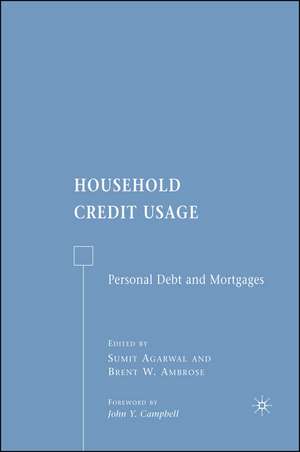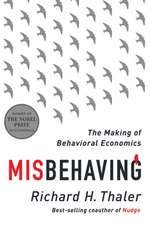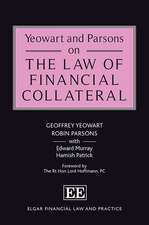Household Credit Usage: Personal Debt and Mortgages
Autor B. W. Ambrose Cuvânt înainte de Kenneth A. Loparo Autor S. Agarwalen Limba Engleză Hardback – 20 dec 2007
| Toate formatele și edițiile | Preț | Express |
|---|---|---|
| Paperback (1) | 387.96 lei 43-57 zile | |
| Palgrave Macmillan US – 20 dec 2007 | 387.96 lei 43-57 zile | |
| Hardback (1) | 396.78 lei 43-57 zile | |
| Palgrave Macmillan US – 20 dec 2007 | 396.78 lei 43-57 zile |
Preț: 396.78 lei
Nou
Puncte Express: 595
Preț estimativ în valută:
75.95€ • 82.52$ • 63.84£
75.95€ • 82.52$ • 63.84£
Carte tipărită la comandă
Livrare economică 21 aprilie-05 mai
Preluare comenzi: 021 569.72.76
Specificații
ISBN-13: 9781403983923
ISBN-10: 1403983925
Pagini: 304
Ilustrații: XIV, 290 p. 12 illus.
Dimensiuni: 152 x 229 x 21 mm
Greutate: 0.62 kg
Ediția:2007
Editura: Palgrave Macmillan US
Colecția Palgrave Macmillan
Locul publicării:New York, United States
ISBN-10: 1403983925
Pagini: 304
Ilustrații: XIV, 290 p. 12 illus.
Dimensiuni: 152 x 229 x 21 mm
Greutate: 0.62 kg
Ediția:2007
Editura: Palgrave Macmillan US
Colecția Palgrave Macmillan
Locul publicării:New York, United States
Cuprins
Foreword by John Y. Campbell PART I: INTRODUCTION Household Finance and the Financial Decision-Making Process; S.Agarwal & B.W.Ambrose PART II: HOUSEHOLD CREDIT: DEMAND AND SUPPLY Recent Developments in the Credit Card Market and the Financial Obligations Ratio; K.Johnson Household Credit Counseling; R.Hunt Household Bankruptcy Decision; A.Lehnert & D.Maki PART III: HOUSEHOLD USE OF PERSONAL CREDIT Collateral and Sorting: An Empirical Investigation into Home Equity Lines of Credit; S.Dey & L.Dunn Automobile Loans and Information Asymmetry; S.Agarwal, B.W. Ambrose ,& S.Chomsisengphet Introductory Credit Card Interest Rates and Balance Switching Behavior of Cardholders; T.Ekici, L.Dunn& T.Kim. Do Personal and Business Credit Mix? An Examination of Family Owned Businesses; G.Kim Debit Cards and Consumer Credit and Debt; M.Fusaro Linkages between Consumer Payments and Credit; S.Chakravorti Payday Lending: Industry Structure and Policy Implications; K.Samolyk PART IV: HOUSEHOLD USE OF MORTGAGE DEBT Is Buying Really Better than Renting?; T.Somerville & P.Teller Choosing between Fixed and Adjustable Rate Mortgages; M.Paiella & A.Pozzolo Sub-Prime Borrowers and Interest Rates; S.Chomsisengphet & A.Pennington-Cross Synthesis of Issues Surrounding Borrower Prepayment and Default in Residential Mortgages; M.LaCour-Little PART V: REGULATORS' PROSPECTIVE OF CONSUMER CREDIT Statistical Analysis and Modeling for Fair Lending and Compliance: The OCC's Perspective; M.Pocock, I.Fang & J.Dietrich
Notă biografică
SUMIT AGARWAL is a financial economist in the research department at the Federal Reserve Bank of Chicago, USA. His research interests include issues relating to household finance, as well as corporate finance, financial institutions and capital markets. His research has been published in the Journal of Money, Credit and Banking, Journal of Financial Intermediation, Journal of Housing Economics and Real Estate Economics. Prior to joining the Chicago Fed in July 2006, Agarwal was a Senior Vice President and Credit Risk Management Executive in the Small Business Risk Solutions Group of Bank of America. He also served as an adjunct professor in the finance department at the George Washington University. Agarwal received a Ph.D. from the University of Wisconsin-Milwaukee, USA.
BRENT W. AMBROSE is the Jeffery L. and Cindy M. King Faculty Fellow in Business and Professor of Real Estate at the Pennsylvania State University, USA. Prior to joining Penn State University, Dr. Ambrose was the Director of the Center for Real Estate Studies and Professor of Finance at the University of Kentucky where he held the Kentucky Real Estate Professorship. In addition, Dr. Ambrose was an Associate Professor at the University of Wisconsin-Milwaukee where he directed the UWM real estate program and from 1997 to 1998 he was a Visiting Associate Professor and Research Fellow at the University of Pennsylvania Wharton School of Business. Dr. Ambrose served as the Executive Vice President of the American Real Estate and Urban Economics Association from 1996 to 2003 and in 2003 was elected a Fellow of the Weimer School of Advanced Studies in Real Estate and Land Economics at the Homer Hoyt Advanced Studies Institute. In 2004, he was elected a Fellow of the Real Estate Research Institute and in 2006 he was appointed a Fellow of the FDIC Center for Financial Research. Currently, Dr. Ambrose serves on the editorial boards of the Journal of Real Estate Finance and Economics, the Journal of Real Estate Research, and Real Estate Economics, and is a member of the board of directors for the Real Estate Research Institute and the American Real Estate and Urban Economics Association.
BRENT W. AMBROSE is the Jeffery L. and Cindy M. King Faculty Fellow in Business and Professor of Real Estate at the Pennsylvania State University, USA. Prior to joining Penn State University, Dr. Ambrose was the Director of the Center for Real Estate Studies and Professor of Finance at the University of Kentucky where he held the Kentucky Real Estate Professorship. In addition, Dr. Ambrose was an Associate Professor at the University of Wisconsin-Milwaukee where he directed the UWM real estate program and from 1997 to 1998 he was a Visiting Associate Professor and Research Fellow at the University of Pennsylvania Wharton School of Business. Dr. Ambrose served as the Executive Vice President of the American Real Estate and Urban Economics Association from 1996 to 2003 and in 2003 was elected a Fellow of the Weimer School of Advanced Studies in Real Estate and Land Economics at the Homer Hoyt Advanced Studies Institute. In 2004, he was elected a Fellow of the Real Estate Research Institute and in 2006 he was appointed a Fellow of the FDIC Center for Financial Research. Currently, Dr. Ambrose serves on the editorial boards of the Journal of Real Estate Finance and Economics, the Journal of Real Estate Research, and Real Estate Economics, and is a member of the board of directors for the Real Estate Research Institute and the American Real Estate and Urban Economics Association.














